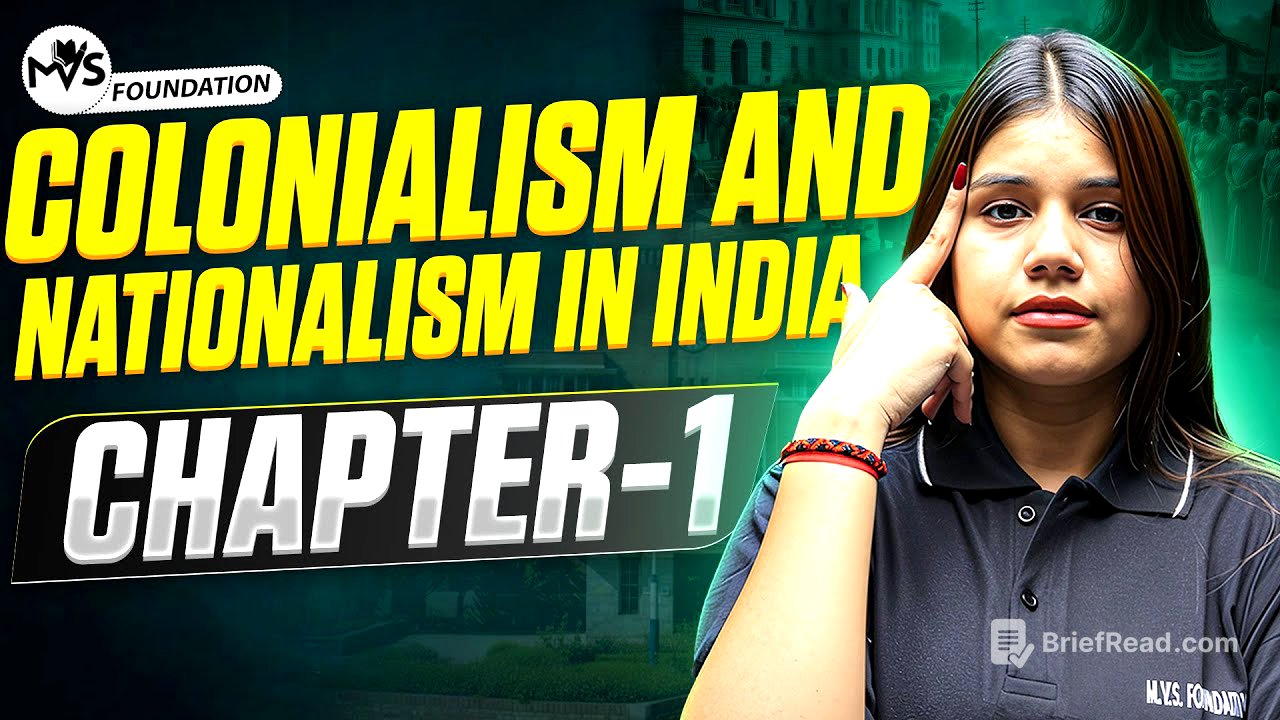TLDR;
This video introduces the first chapter of a BA honors subject, "Colonialism and Nationalism in India." It explains colonialism and nationalism in India, discussing the perspectives of liberalism, Marxism, and post-colonialism. It also touches upon the positive and negative impacts of colonialism, the concepts of colonialism versus imperialism, and the consequences of colonial rule.
- Colonialism and Nationalism are key concepts.
- Liberalism, Marxism, and Post-Colonialism are the three main perspectives.
- Colonialism had both positive and negative impacts.
Power Politics and Colonial Rule [0:06]
The video introduces the topic of colonialism and nationalism in India, emphasizing its importance as the foundation for understanding the entire book. It outlines the plan to examine the philosophies and impacts of British rule over 200 years, including various perspectives on the experience. The video also mentions the availability of free notes on the Manish Verma app, accessible via a link in the description box.
Introduction to Colonialism and Nationalism [2:23]
The chapter begins by defining colonialism as the establishment of control by one country over another, primarily for economic benefit. It references historical context, such as the decline of the Mughal Empire, which created an opportunity for the British to establish dominance in India, attracted by its rich agriculture and raw materials. The Oxford Dictionary defines a colony as a place ruled by a distant country, often settled by its people. The Stanford Encyclopedia of Philosophy explains colonialism as the process by which European countries controlled parts of Asia, Africa, and the Americas. The British exploited India's resources and altered its society to suit their needs.
Colonialism vs. Imperialism [8:57]
The video differentiates between colonialism and imperialism, defining imperialism as the imposition of a country's ideas and philosophy on another, even without direct occupation. Examples include the influence of American brands like McDonald's and the adoption of foreign clothing styles. Colonialism, in contrast, involves physical occupation and settlement. Neo-imperialism is also mentioned, referring to the subtle influence and adoption of foreign cultures and preferences.
Marxist View [12:30]
The video introduces the Marxist perspective, contrasting it with liberalism. Karl Marx viewed British actions negatively, asserting that they looted and ruined India. Followers like Lenin saw imperialism as the highest stage of capitalism, where private companies dominate. Lenin described three stages of capitalism: monopoly (control by a few companies), parasitic (exploitation of poor nations by rich ones), and moribund (dying capitalism requiring new colonies to survive). The Marxist view is that colonialism and imperialism led to the rise of capitalism, benefiting new companies at the expense of the old order.
Consequences of Colonialism [17:20]
The video discusses the consequences of colonialism, noting both positive and negative effects. According to Rupert Tomerson, the main features included foreign rule and economic exploitation. India's raw materials were used for Britain's benefit, leading to unequal growth. However, there were positive impacts, such as the introduction of education, liberal ideas, and new technologies like the railway, which inspired national movements and reforms.
Nationalism [20:55]
The video defines nationalism as a shared feeling of unity and pride among people living in the same region, who see themselves as one nation socially, culturally, economically, or politically. It is expressed through symbols like the national flag and anthem, and includes a psychological sense of belonging. Nationalism awakened a sense of self-rule and independence, influencing people to resist British rule.
Three Main Perspectives: Liberalism, Marxism, and Post-Colonialism [25:23]
The video highlights the three main perspectives on colonialism: liberalism, Marxism, and post-colonialism. Liberalism views colonialism as a normal stage in the development of political and economic relationships between countries, focusing on the positive impacts such as promoting freedom and individual rights. Marxism views colonialism negatively, emphasizing struggle and exploitation. Post-colonialism focuses on the lasting cultural and economic effects of colonialism, even after independence.
Liberalism in Detail [30:25]
The video details the liberal perspective, which sees colonialism as a part of capitalism expansion and global growth that began in the 16th century. It notes that countries like Britain needed new markets and raw materials, and India became an important colony for this purpose. Liberals view British colonial expansion as a natural result of capital's market growth around the world. They also see colonialism as connecting India to the global system, though not as an equal partner, primarily serving the interests of colonial powers.
Liberalism: Drain of Wealth [36:24]
The video discusses the liberal view on the drain of wealth from India, considering it a natural outcome of colonial rule. The East India Company's policies used India's resources to benefit Britain, leading to unfair trade and heavy land taxes. Dadabhai Naoroji and Mahatma Gandhi criticized British rule for causing the collapse of rural life and traditional industries. Despite this, liberals saw India's colonial experience as part of global historical patterns of exploitation, not just a social issue.
Marxist Perspective: Colonial State as a Bourgeois State [40:23]
The video explains the Marxist perspective, viewing the colonial state as a state of the rich class. Marxists see colonialism as a system based on conflicts between the interests of the Indian people and the British rulers. They believe this struggle led to the rise of Indian nationalism but also focus on class conflicts within Indian society. According to Marxists, the Indian National Movement was mainly a movement of the bourgeois middle and upper classes.
Marxist Perspective: Economy and Society Control [43:57]
The video continues with the Marxist perspective, stating that dominant classes controlled the economy and society. Marxists view colonialism as a stage where a country becomes part of the world capitalist system in a dependent position. The colony's economy and social structure are shaped by the interests of the ruling capitalist class in the colonial power, not by its own people's needs. Colonies served as suppliers of raw materials, and infrastructure like railways was built to serve British trade interests, not to develop India's economy.
Marxist Perspective: Surplus from the Colony [47:29]
The video concludes the Marxist perspective by explaining that the surplus from the colony was used to benefit the imperialist center. The drain of wealth meant that much of the profit produced in India was taken to Britain, disturbing India's economy and real growth. This exploitation served the interests of the palace center rather than the colony, keeping India suppressed.
Post Colonialism [50:15]
The video introduces post-colonialism, which studies the lasting cultural, political, and economic effects of colonialism. It challenges the belief in Western superiority and aims to reclaim identity and dignity for formerly colonized people. Post-colonialism links global inequality and underdevelopment to the colonial past, asserting that decolonization must begin with freeing the mind from feelings of inferiority.
Post Colonialism: Influence and Inequality [53:16]
The video continues discussing post-colonialism, linking global inequality and underdevelopment to the colonial past. It highlights how Western influence has led to a psychological belief in superiority, creating discrimination and inequality. Edward Said's "Orientalism" shows how the West portrayed Eastern societies as inferior. Post-colonialism seeks to challenge ongoing colonial influences in the modern world and reclaim identity and dignity for formerly colonized people.
Summary [55:34]
The video summarizes the key concepts discussed: colonialism (one country taking over another), imperialism (influences occurring without direct control), and nationalism (the feeling of unity and pride within a country). It recaps the three main perspectives: liberalism (counting positive outcomes), Marxism (counting negative outcomes), and post-colonialism (the lasting impact of colonialism even after independence). The video concludes by encouraging viewers to download the notes from the app and engage with the material.









